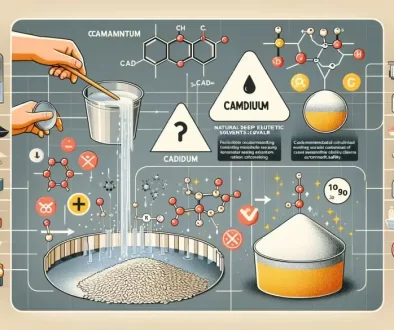Uncertainty Assessment Of Determination Of Inorganic Arsenic In Rice By High Performance Liquid Chromatography-Inductively Coupled Plasma Mass Spectrometry
Evaluating measurement uncertainty in rice’s inorganic arsenic analysis using HPLC-ICP-MS, highlighting methodology, results, and importance for safety standards.
Objective To evaluate the uncertainty of liquid chromatography-inductively coupled plasma mass spectrometry in the determination of inorganic arsenic in rice. Method: High performance liquid chromatography-inductively coupled plasma mass spectrometry was used to determine the inorganic arsenic content in rice. According to the measurement mathematical model of the analysis process, the measurement repeatability, sample weighing, sample blank, extraction volume, and standard solution preparation were , i-As concentration and recovery rate in the extraction solution were used to calculate the measurement uncertainty. Results The contents of As¢ó, As¢õ, and i-As in the rice flour samples were 0.045, 0.154, and 0.199 mg/kg respectively. Under the 95% confidence interval, their expanded uncertainties were 0.006, 0.012, and 0.030 mg/kg, k= 2. The uncertainty in the measurement process mainly comes from the repeatability of the measurement, the calculation of the inorganic arsenic content in the extraction solution, the preparation of the standard solution and the recovery rate of the method. Conclusion The mathematical model established can reasonably evaluate the uncertainty of the measurement of inorganic arsenic in solid samples by high performance liquid chromatography-inductively coupled plasma mass spectrometry.
Abstract
The determination of inorganic arsenic (i-As) levels in rice is a significant analytical challenge due to the toxicological implications of arsenic compounds. This study presents an evaluation of the uncertainty involved in measuring inorganic arsenic in rice employing High Performance Liquid Chromatography-Inductively Coupled Plasma Mass Spectrometry (HPLC-ICP-MS). The methodology hinges on a comprehensive mathematical model of the analytical process, assessing various factors including measurement repeatability, sample preparation, and calibration procedures to quantify measurement uncertainty.
Introduction
Arsenic, a naturally occurring element, can manifest in inorganic forms that are more toxic and prevalent in certain foods, notably rice. The accurate quantification of i-As in foodstuffs is crucial for assessing exposure risks and ensuring compliance with safety standards. The application of HPLC-ICP-MS in this context offers high sensitivity and specificity but involves complex sample preparation and analytical processes that introduce measurement uncertainty. Understanding and quantifying these uncertainties are imperative for validating the reliability of analytical results.
Methodology
The study employed HPLC-ICP-MS to analyze i-As in rice samples. A meticulous approach was adopted to prepare the samples and calibrate the instrumentation. The measurement uncertainty was computed considering the repeatability of measurements, accuracy of sample weighing, control of sample blank, precision in extraction volumes, and standard solution preparation. Additionally, the concentration of i-As and the recovery rate in the extraction solution were pivotal for calculating the overall measurement uncertainty.
Results
Analysis revealed the presence of As(III), As(V), and i-As in the rice flour samples at concentrations of 0.045, 0.154, and 0.199 mg/kg, respectively. The expanded uncertainties at a 95% confidence interval for these measurements were 0.006, 0.012, and 0.030 mg/kg (k=2), respectively. The study pinpointed the major sources of uncertainty to include measurement repeatability, determination of i-As content in the extraction solution, standard solution preparation, and the method’s recovery rate.
Conclusion
The developed mathematical model effectively evaluates the measurement uncertainty in determining i-As in rice using HPLC-ICP-MS. The study underscores the complexity of measuring trace levels of inorganic arsenic and the importance of a comprehensive understanding of the analytical process to ensure accurate and reliable results. It provides a framework for improving analytical methodologies and enhancing the confidence in the data obtained for regulatory compliance and risk assessment. The quantification of uncertainty is a critical component of the analytical process, guiding method optimization and the establishment of quality assurance protocols.
For further details regarding this research or any inquiries on the topic, our team remains available to provide the necessary assistance and information.
For futher details of this article and research, feel free to contact our team for assistance.
About ETprotein:
ETprotein, a reputable plant protein vegan protein Chinese factory manufacturer and supplier, is renowned for producing, stocking, exporting, and delivering the highest quality organic bulk vegan protein and plant proteins. They include Organic rice protein, clear rice protein, pea protein, clear pea protein, oat protein, watermelon seed protein, pumpkin seed protein, sunflower seed protein, mung bean protein, peanut protein, various of plant peptides etc. Their offerings, characterized by a neutral taste, non-GMO, allergen-free attributes, cater to a diverse range of industries. They serve nutraceutical, pharmaceutical, cosmeceutical, veterinary, as well as food and beverage finished product distributors, traders, and manufacturers across Europe, USA, Canada, Australia, Thailand, Japan, Korea, Brazil, and Chile, among others.
ETprotein specialization includes exporting and delivering tailor-made protein powder and finished nutritional supplements. Their extensive product range covers sectors like Food and Beverage, Sports Nutrition, Weight Management, Dietary Supplements, Health and Wellness Products, and Infant Formula, ensuring comprehensive solutions to meet all your protein needs.
As a trusted company by leading global food and beverage brands and Fortune 500 companies, ETprotein reinforces China’s reputation in the global arena. For more information or to get a free sample of their protein products, please contact them and email sales(at)ETprotein.com today.












